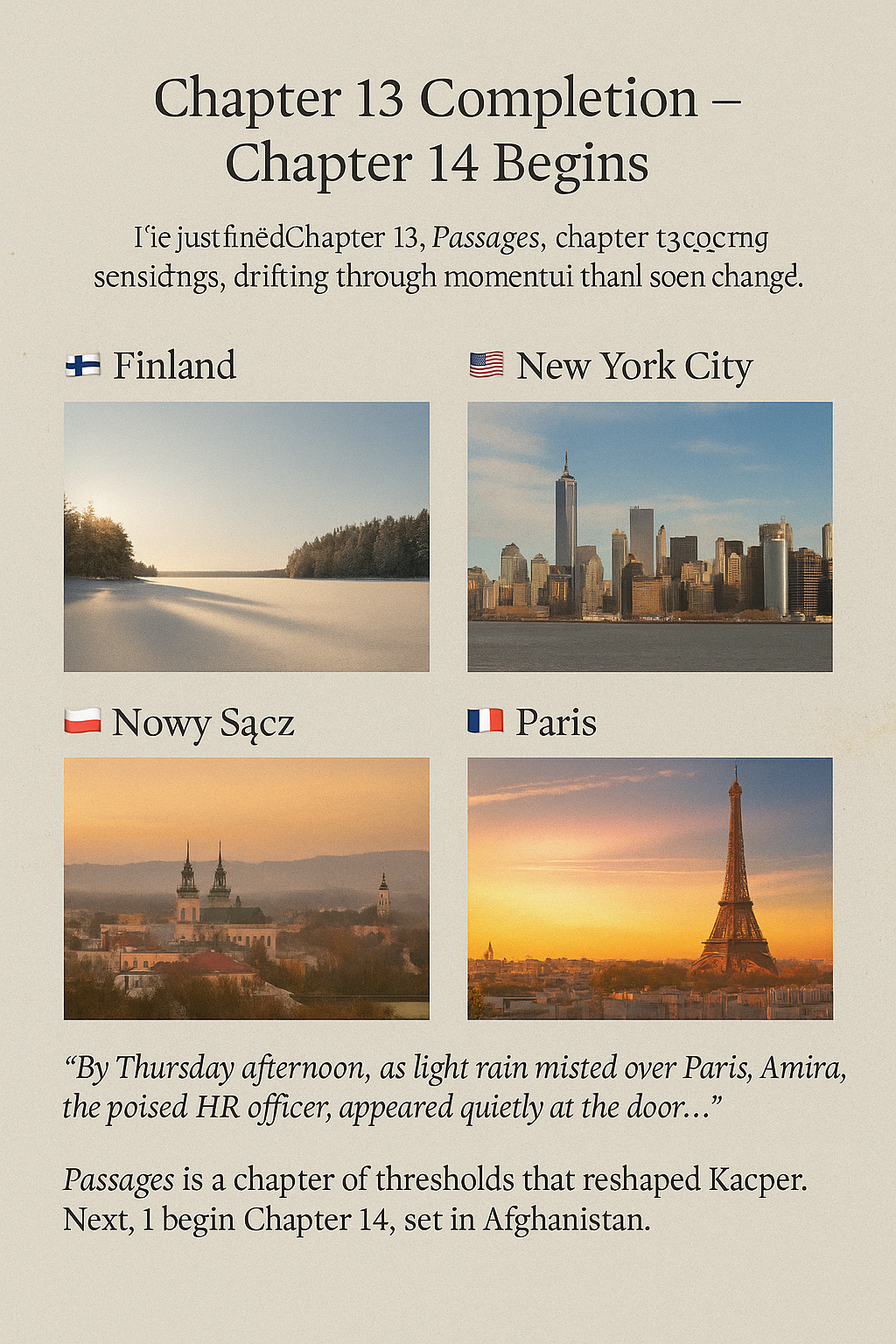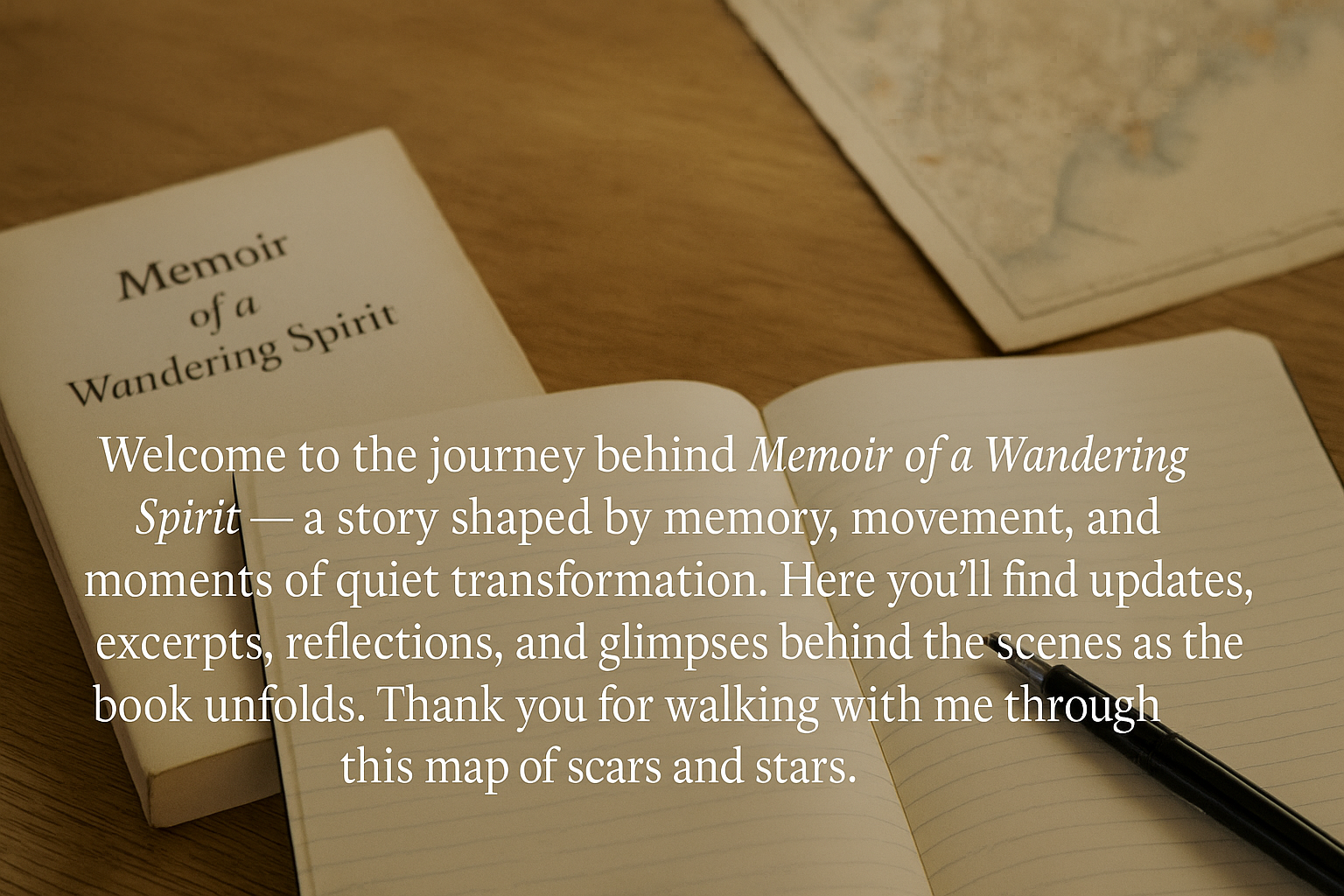Chapter 13 Completed – Chapter 14 Begins

I’ve just finished Chapter 13: Passages, a chapter where Kacper crosses oceans and seasons, drifting through moments of stillness and momentum that will soon change everything.
It begins in Finland, where winter swallows the horizon in white silence. Kacper steps out of Helsinki airport into air so sharp it feels crystalline. Snow muffles the city’s sounds; Senate Square gleams like a frozen crown. In Lahti, Leena greets him with warmth and tea, their conversations echoing dreams born in Angola and Denmark. A train ride east carries him through endless forests bent under snow, past golden lights in lone farmhouses, until he reaches Kesälahti. There, a tiny school welcomes him with laughter and curiosity. He walks frozen lakes, runs barefoot from the sauna into starlit snow, and finds in Finland a vast stillness that lets him listen to himself again.
From Finland, the journey takes a bold leap to New York City. The Atlantic crossing feels like stepping into myth. Manhattan’s skyline shimmers like fallen constellations as the plane descends. A kind couple welcomes him, handing over the keys to their apartment overlooking Central Park. Suddenly, a boy from Biegonice lives alone in Manhattan. He roams Fifth Avenue, samples hot dogs and pretzels, and feels the city’s pulse under spring sunlight. He meets strangers who remind him that the world is wider than skyscrapers, stands at Battery Park watching ferries glide toward the Statue of Liberty, and imagines one day walking the halls of the UN. Meals are simple, but each bite tastes of arrival, of possibility cracking open under New York’s chaotic sky.
After a week, Kacper returns to Nowy Sącz. Winter is thawing, mountains breathe faint mist, and the house in Biegonice feels both comforting and small. He teaches English to earn a living, crosses into Slovakia on weekends, and keeps writing letters to NGOs scattered across continents. Then comes the email that shifts everything: an offer to work in Afghanistan with a humanitarian organisation. Training first in Paris. The news thrills his mother and frightens her, but beneath her fears lies pride.
And so comes Paris — not as a postcard dream, but as a gateway into a new life.
Kacper arrives with little more than a suitcase and a folder of instructions, stepping into a city that feels alive with purpose. The headquarters of the humanitarian organisation occupies a modest building, its rooms buzzing with quiet intensity. Maps of conflict zones line the walls, corridors echo with hurried footsteps, and meeting rooms hum with a dozen languages.
Training is relentless but exhilarating. From dawn till late evening, Kacper and other recruits are immersed in the realities of crisis response — how aid reaches besieged towns, how convoys thread through war zones, how negotiations open fragile corridors of safety. He learns about logistics, emergency health interventions, food security, and the silent strength of coordination that keeps field teams alive. Security briefings describe kidnappings and evacuations with unnerving calm. He begins to grasp the weight of responsibility that comes with entering a place where survival is not guaranteed.
But Paris is more than classrooms and briefings. The city itself becomes part of his initiation. At dawn, he walks along the Seine where mist rises from the water like breath from the city’s lungs. After long days of training, he wanders through Montmartre’s crooked alleys, discovering tiny bistros where jazz floats through the doorways. He loses himself in the Musée d’Orsay, stares at Van Gogh’s fevered skies, and feels both overwhelmed and emboldened.
Evenings often end in a café — bitter coffee in Saint-Germain, fresh baguettes eaten on benches near Notre-Dame. He watches Parisians rush past with scarves trailing, listens to animated debates about politics and poetry, and feels the city slowly seep into him. For the first time, he imagines a life lived entirely beyond the borders of Poland, shaped by international work and a sense of global belonging.
Paris changes him quietly. It teaches him more than procedures — it gives him rhythm, language, a sense of scale. It shows him that helping others means not only courage but humility and collaboration. The city itself feels like a threshold, preparing him for a path that began in a hospital ward years ago and now stands ready to carry him into conflict zones.
“By Thursday afternoon, as light rain misted over Paris, Amira, the poised HR officer, appeared quietly at the door.
‘Your visas for Pakistan and Afghanistan have been approved,’ she said with a reassuring smile. ‘You’ll leave this Sunday — first to Islamabad, then to Kabul.’
The words settled like both a weight and a liberation. It was no longer whispered possibility beneath Parisian skies. It was real.”
Passages is a chapter of thresholds — from frozen lakes in Finland to New York’s restless skyline, from family warmth in Nowy Sącz to Parisian boulevards glowing at dusk. Each place leaves a trace, each passage reshaping the boy who once lay in Polish hospitals into a man ready to step into one of the world’s most fragile frontiers.
With this chapter closed, I now begin Chapter 14, where Kacper steps into Afghanistan — a place where fear and purpose will meet under a sky filled with dust, mountains, and war.
Photos from Finland
Photos from NYC

